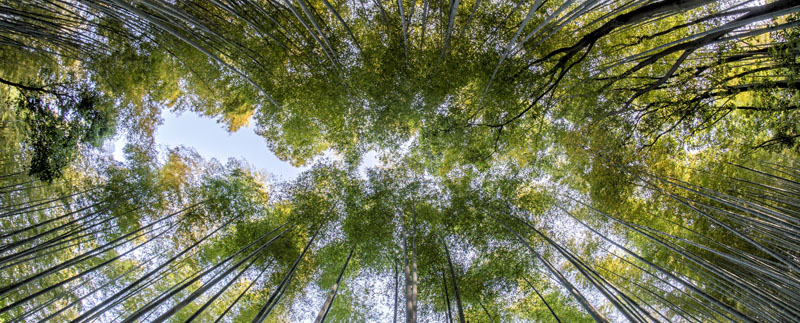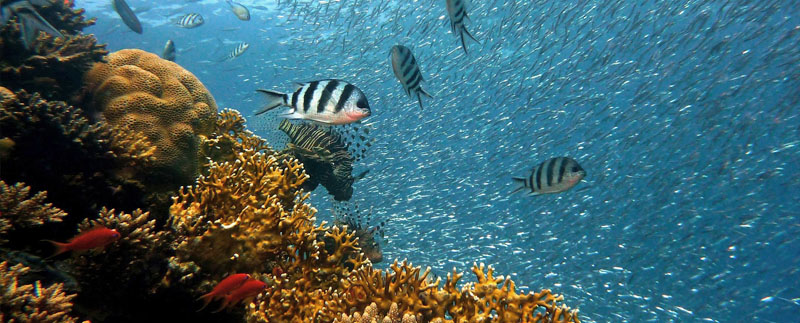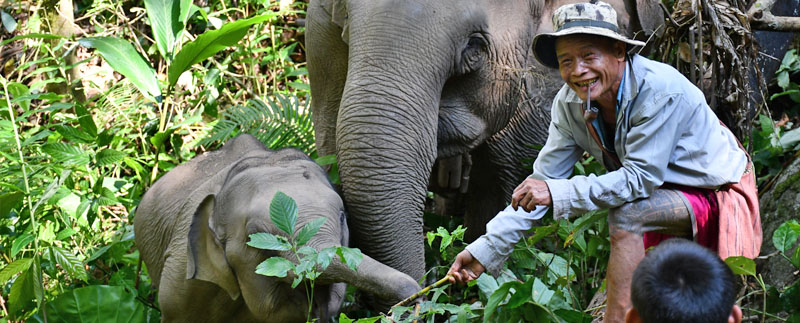Tag: nature
ANIMONDIAL declares a climate emergency

There is no doubt, Planet Earth is experiencing the highest atmospheric CO2 concentrations that have not been equalled for millions of years, with resulting temperature rises threatening the balance of life and the collapse of everything that gives us security.
…
ANIMONDIAL, the specialist consultancy supporting the travel and tourism businesses to better protect animals and nature, acknowledges the Climate Emergency, and offers a means for the tourism sector to embrace the “silver bullet” to lessen climate change and save ourselves.
This requires much more than just counting and reducing carbon output, it requires the better protection and regeneration of the natural systems that already absorb carbon and bring stability to life on Earth.
Professor Schellnhuber, Director Emeritus at Potsdam Institute for Climate Impact Research, speaking at ITB Berlin earlier this month, acknowledged that nature is our “silver bullet” to combating climate change. He acknowledged nature’s ability to absorb carbon and maintain ecological balance, advocating a complete change in global priority-setting, whereby animal and nature protection underpins all human activity.
Whilst tourism can exploit nature, wildlife, and the limited natural resources, if managed well, it brings value and investment to animal and nature protection, and ecosystem services. Tourism can be a force for good and through cross-sector effort, tourism could become the driver for meaningful change. ANIMONDIAL helps guide travel and tourism businesses to make the right choices to Build Back Better for Animals and nature.
Humans and domesticated animals now account for 95% of all biomass on Earth, with wild mammals, birds, reptiles, and amphibians being about 5% (Bar-On et al., 2018; Elhacham et al., 2020). Human activity has already altered over 70% of the Earth’s land surface (IPBES, 2019) and more than two-thirds of the oceans (Halpern et al., 2015) through the loss of biodiversity and habitat degradation (IPBES, 2019). This has already resulted in an average 68% decline in population sizes of vertebrate species (WWF, 2020) and 1 in 5 recorded animal and plant species facing extinction (IUCN, 2020). Humanity is already consuming 1.6 times more resource than the Earth can naturally provide (Global Footprint Network), and if nothing is done to lessen the impact, nature’s ability to prevent atmospheric CO2 overload and spiralling global warming, will be severely compromised (C. Bradshaw et al., 2021).
Scientists, NGOs and governments have been telling us for years that humanity must seek to better manage its impact. Various global initiatives have tried to bring structure and interpretation to the required efforts (UN Sustainable Development Goals, the Aichi Targets, the Triple Bottom Line, etc.) but as acknowledged by Anna Pollock during ATTA’s AdventureELEVATE Virtual Europe, these have all failed to achieve their goals – crippled by a lack of commitment, collaborative action, an overabundance of targets and a lack of sector practicability. Later this year, CoP15 on biological diversity, and CoP26 on climate change, may well set more targets, which could well fail, but perhaps we should instead focus on priorities rather than trying to address every challenge at once?
Whilst it is easy to become overwhelmed and disillusioned by the mounting evidence of the Climate Emergency, there is hope. Hope that through our concerted efforts, we can lessen negative impact, better protect and regenerate nature, and improve the Earth’s ability to retain ecological balance. Businesses, not only governments, must step-up and adopt sustainable practices that better protect the life on which we depend.
ANIMONDIAL does not claim to have all the answers, but it does have the vision and the drive to work with others, combine knowledge and efforts, to simplify complexity and overcome challenges, and the ability to deliver meaningful change. In the months and years ahead, ANIMONDIAL will do what it can to connect, inform, inspire, and empower sustainable and regenerative tourism that prioritises the better protection of animals and nature – but we cannot do this alone.
What can you do?
Reconnect with nature
As a part of nature ourselves, we must provide opportunity for travellers to reconnect, understand, appreciate and respect nature as our lifeline for wellbeing and prosperity.
Safeguard individual welfare
Ensuring all animals involved in holiday or vacation offerings / excursions have a life worth living. Where a respect for life on Earth starts with recognising and safeguarding their individual and species-specific needs.
Overcome industry challenges
Alternative to ‘stop sale’, work with your partners and suppliers to develop responsible alternative experiences to those activities with animals evidenced to compromise animal welfare and survival.
Protect threatened species
Underpinning biological diversity, efforts must seek to prevent the killing, wild-capture, trade and sale of animal and plant species threatened with extinction, and to better protect endemic fauna and flora.
Invest in nature
Bring much needed support and value to community-based animal protection and nature conservation, encouraging local people to value wildlife and natural habitat alive, not dead.
Together we can Build Back Better for Animals, where nature-friendly tourism is part of the solution to lessen the global problem of climate change.
…
» Learn more about ANIMONDIAL’s Build Back Better for Animals! Sign up to the initiative and received information and exclusive offers on trainings and services.
REFERENCES
- Bar-On, Y. M., Phillips, R., and Milo, R. (2018). The biomass distribution on Earth. Proc. Natl. Acad. Sci. U.S.A. 115:6506–6511. doi: 10.1073/pnas.1711842115
- Bradshaw CJA, Ehrlich PR, Beattie A, Ceballos G, Crist E, Diamond J, Dirzo R, Ehrlich AH, Harte J, Harte ME, Pyke G, Raven PH, Ripple WJ, Saltré F, Turnbull C, Wackernagel M and Blumstein DT (2021) Underestimating the Challenges of Avoiding a Ghastly Future. Front. Conserv. Sci. 1:615419. doi: 10.3389/fcosc.2020.615419
- Elhacham, E., Ben-Uri, L., Grozovski, J., Bar-On, Y. M., and Milo, R. (2020). Global human-made mass exceeds all living biomass. Nature 588, 442–444. doi: 10.1038/s41586-020-3010-5
- Global Footprint Network (2021)
- IPBES (2019). Global Assessment Report on Biodiversity and Ecosystem Services. Paris: IPBES Secretariat.
- WWF (2020). Living Planet Report 2020. Gland: WWF.

Save ‘Life Below Water’

This year, there are two important international events to galvanise efforts to address the deepening crises of biodiversity loss and climatic change.
…
The Convention of Biological Diversity in China in May will seek to secure commitments to halt biodiversity-loss, whilst the UN Climate Change Conference in Glasgow in November, will aim to further the Paris Agreement goals and reduce carbon emissions.
These will both require cross-government commitment but, it will be their resulting actions that will be assessed for years to come, as to whether enough was done to avert these crises and reach a ‘new stable state’.
Sir David Attenborough gave an impassioned speech to the UN Security Council this week. He urged the assembly of nations for their immediate collaborative action to avert the global “collapse of everything that gives us security”, to work together to lessen climate change, and “to value nature… beyond money”. He recounted the rising global temperatures, current atmospheric CO2 concentrations “that have not been equalled, for millions of years”, the despoiling of oceans, and the catastrophic decline of biodiversity as the contributing factors. Above all, he recognised the need for every one of us to do what we can to lessen the resulting disasters ahead.
We, of course, expect our governments to step-up, listen to Sir David and other experts, and take the immediate, necessary action but, what can we do as businesses, and as individuals?
I know many of us are currently focused on our own survival during this current COVID-19 crisis, but it is also an ideal time for the travel and tourism business to review its pre-pandemic activity: identify negative impact, and seek to better manage, or ideally minimise it. I believe that actions must now be more than just ‘reduce, reuse, and recycle’, in fact we should adopt a multifaceted approach that seeks to address the key drivers of climate change: carbon emissions, over-exploitation of natural resources, and biodiversity loss.
Animal protection may not be the priority for most travel businesses, but recognising its impact on climatic change, perhaps it should be…
I co-founded ANIMONDIAL to help the travel and tourism sector work through the complexities of animal and nature protection in tourism and identify which actions can be taken to minimise negative impact and restore the health of the natural environment. It is certainly vital to ensure your product offerings are aligned to your animal protection commitment but why not also think about how you can restore biodiversity in the destinations you visit. ANIMONDIAL’s Build Back Better for Animals initiative is offering webinars, trainings and services to inform, inspire and empower travel and tourism professionals. Providing all that you need to assess impact, and review and improve current practices.
For example, consider what you can do to better protect our oceans and seas.
These cover 70% of Earth’s surface and within them live tiny plant-like organisms, known as phytoplankton. Just like plants and trees they contain chlorophyll that capture sunlight and use photosynthesis to convert it to energy, producing oxygen as a by-product. Phytoplankton are as equally important as rainforests and woodlands and produce over 50% of the world’s oxygen and absorbs 50 x more carbon dioxide than our atmosphere (World Economic Forum, 2019). They also support all life within seas and oceans, including approximately 16% of all animal protein consumed globally and the livelihoods of 40 million people (OECD, 2016).
Damage to these fragile environments, through pollution (plastic, chemical, fertilisers, etc), overfishing and trawling, damping of waste, etc., kills the phytoplankton, realising stored carbon, and removes that life support. Not only does this exacerbate global warming, but also threatens to change our climate and weather patterns. According to the US National Oceanic and Atmospheric Administration “more than 90% of the warming that has occurred on Earth over the past 50 years has happened within the ocean”.
The point I wish to make is that whilst it is important to focus on carbon emission reduction, such as converting to green energies and cutting out single-use plastics, it is equally, if not more important to protect and regenerate the life on Earth that already exists. From ‘Life Under the Water’ (SDG14) to ‘Life on Land’ (SDG15). A mature tree holds over 100 times more carbon, and life support, that a newly planted sampling; placing more importance to preserving primary forests than planting more trees.
By adopting measures to better protect animals (biodiversity) and nature (life support), we have a chance to lessen the crises that Sir David had said are inevitable if ‘we’ continue on ‘our’ current path.
Each month I aim to focus on different natural environments and mention projects that are doing great work to better protect that environment. Offering travel businesses the opportunity to learn about their work, I hope travel businesses will support their activities and fulfil their SDG obligations. This month, acknowledging the start of the UN Decade of Ocean Science for Sustainable Development – a framework to support the sustainable management of the oceans – I have focused on actions to save ‘Life Below Water’ SDG14 – “to conserve and sustainably use the oceans, seas and marine resources for sustainable development”. The following are all members of ANIMONDIAL’s Animal Protection Network:
Save the Aegean
Save the Aegean is an initiative of the Archipelagos Institute of Marine Conservation that aims to form an alliance between environmentalists, scientists, businesses, and consumers to reduce the environmental footprint on this popular sea.
Save the Aegean aims to contribute to the protection and preservation of the Aegean Sea’s rare biodiversity, through filling in knowledge gaps via research and awareness raising through effective conservation actions and eco-tourism.
Aegean Marine Life Sanctuary (AMLS)
The Aegean Marine Life Sanctuary aims to become the world’s first sanctuary for dolphins, displaced from zoo attractions, and provide rescue and rehabilitation of sick, injured or ‘at-risk’ marine animals. Serving as a model of a multi-disciplinary teaching facility, AMLS will focus on providing solutions-based initiatives to better protect marine mammals and turtles through a ‘unified’ Mediterranean Marine Mammal Rescue Network.
Barbados Environmental Conservation Trust (BECT)
The Barbados Environmental Conservation Trust (BECT) has been set up to enable and support local communities and environmental activities aimed at the preservation and restoration of Barbados’ natural assets including the conservation of its marine life. Supported projects include the protection of marine life, particular turtles, and the regeneration of its coral reefs. Efforts seek to restore the country’s marine biodiversity, protect its beaches from erosion, and boost the attractiveness of the habitats for ecotourism.
CCell
A UK-based organisation, CCell was founded to solve the one of the of most devastating effects of climate change: The degradation of the world’s coral reefs and coastal erosion. CCell provides a cost-effective, long-term and sustainable solution by utilising energy from renewable sources to generate rock at a rate grown 2-3 times faster than in nature.
Corals grown in hatcheries are planted onto the rock creating a reef benefitting the environment and providing comprehensive coastal protection. Their pilot project in Mexico is underway and in collaboration with the local community and international artists, they now wish to develop an underwater attraction to appeal to the eco-tourism market and extend the protected marine zone. The project aims to improve knowledge and encourage cross-community support creating a site of marine restoration, environmental education and cultural appreciation.
Please get in touch if you would like to be introduced to one of these exciting projects that are protecting Life Below Water.
…
» More about ANIMONDIAL’s Animal Protection Network
» Sir David Attenborough’s speech to the United Nations Security Council (February 2021)

How the COVID-19 pandemic has affected animals

Photo: Mahouts Elephant Foundation
…
World news during the COVID-19 lockdown has been full of reports documenting what appears to be a revitalised nature. As human activity – industry, transport, and tourism – has stopped during global lockdown, levels of air, water and noise pollution have dramatically dropped, and nature has taken advantage. So much so, there have been encouraging reports of rewilding of urban areas. Where wildlife, from coyotes, spotted at the Golden Gate Bridge, to deer, wild horses and boar seen gazing in downtown Washington DC, Izmir and Barcelona, to dolphins observed swimming in Istanbul’s Bosphoros and the canals of Venice, have seemingly taken advantage of the lack of humans.
In my last blog, I considered humanity’s negative impact on nature and how our activities are causing heightened loss of biodiversity, which in turn, threatens our own existence. Now that human activity is reduced, due to the COVID-19 lockdown, it presents a unique opportunity to see if, and how nature will take back control, but further how humanity can better manage its negative impact on nature.
For instance, the lack of tourists visiting national parks may well have stemmed the tide of negative impact caused by ‘overtourism’, but the lack of tourism revenue has resulted in park staff losing their employment, ending anti-poaching patrols and wildlife monitoring, and local people, their livelihoods. However, this has caused other pressures, with conservation NGOs raising the alarm that threatened wildlife are suffering from heightened illegal logging and wildlife poaching.
ANIMONDIAL’s Animal Protection Network partner, the Archipelagos Institute of Marine Conservation recognises both the positive and negative consequences of the pandemic:
“Whilst COVID-19 has greatly impacted our research and conservation work due to travel restrictions, this unique situation has provided a unique opportunity to monitor marine ecosystems, which for the first-time face reduced human impact and minimal underwater noise pollution. It has also given Archipelagos more time to devote to the continued development of the Aegean Marine Life Sanctuary. Once complete this will provide refuge for dolphins, seals, and sea turtles threatened by the immense impact of human activity on our seas and our planet overall.”
Elsewhere, wildlife reliant on humans for food, have ventured into urban areas in search of food. The deer from Japan’s Nara Park and primates in Lopburi Thailand, who are usually fed by tourists, have invaded city streets during the lockdown to find food. Their dependency on ‘free’, and likely calory-rich foods, from people has altered their natural feeding behaviour.
Whereas animals kept in a captive environment, who are also dependent on people for food, but lack the freedom to search for it themselves, are completely dependent on their carers. However, their presence, and the quality of care they provide is often dependent on revenues raised through ticket sales, government subsidised and donations, which have all but stopped the last three months.
This sense of purpose and responsibility for animal protection is evidenced by one of ANIMONDIAL’s partners, Ape Action Africa, a sanctuary for rescued primates in West Africa:
“Our initial challenge was to do everything possible to protect our rescued primates from the risk of COVID-19. Enhanced health and safety protocols were put in place, and our team began living permanently on-site; education and community programmes were suspended, and our doors were closed to the public. Though these steps have so far been effective in keeping our endangered gorillas, chimpanzees and monkeys safe, their future is by no means secure. Our income has dropped dramatically, and we are facing the biggest funding crisis in our history. We have cut our costs as far as possible, but we have to provide care for our 280 rescued primates, and our financial reserves are rapidly diminishing. We would ask anyone who is in a position to support our work to please donate and help us keep caring through these incredibly challenging times.”
Equally, the lack of tourism revenue has been tough on animal-based attractions. Reports from Thailand reveal that most of the 300+ elephant tourism venues have closed. The lack of income and restrictions on business operation has meant that many of the elephants have had to leave the venues and return home. This includes the elephant “centrals” like Ban Taklang Elephant village in East Thailand. Here the elephants’ sustenance and shelter has become the responsibility of their original owners who, before the pandemic, had survived off the rent of their elephants to the tourist camps. Now with no income, their future, that of their families and their elephants are becoming increasingly desperate.
If these hardships continue, only the most resourceful will survive. As demonstrated by ANIMONDIAL partner, the Mahouts Elephant Foundation, which runs ethical elephant-based experiences in northern Thailand:
“Overnight there was a complete stop in guest bookings that included international school groups, our own annual study abroad field course and some ground-breaking exciting research. All income came to an abrupt halt which is a huge challenge for any organisation. Whilst we have re-scheduled some bookings for later in the year, it will take some time for things to return to pre-pandemic normality. We are a highly skilled team on the ground and I am so incredibly proud of our team for re acting with professionalism and a passion for the work we do, everyone without exception has pulled together and due to some emergency funding we are keeping our whole team intact. We are continuing with planned infrastructure work, offering those in the community intensive English lessons and teaching mindfulness to key members of the team. We are excited to re-launch our guest programme as soon as travel is open again.”
Whilst it is fair to say that wildlife in the wild has had some respite from destructive human interference, it is perhaps premature to state that nature as made a comeback. However, these 100 days have given us a chance to take stock and change the way we think about change. Ultimately, whether this pandemic is good or bad for the environment depends not on the virus, but on humanity. As lockdowns are eased across the world, we have a choice of returning to unsustainable ‘business as usual’, or to take responsibility for our actions, protect nature, and work towards a better future.
ANIMONDIAL seeks a better world, where tourism is kind to animals. During COVID-19 pandemic, it is offering non-profit organisations access to FREE support and guidance through its ANIMAL PROTECTION NETWORK. Whilst tour operators have the chance to include responsible alternative animal activities in their holiday offerings. If you are interested in finding out more, drop us a message.

